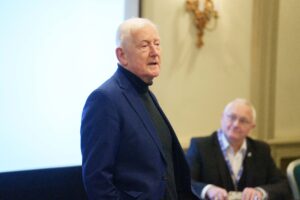Chair of WCRAQ Research working party acknowledges the top four priorities of the Commission, including the push for UK to address diesel particulate filters.
On 22 February, Dr. James Tate of the University of Leeds chaired the working party meeting on the latest Research developments of the Commission and how to best support other parties.
Dr. Tate explained that over the meetings last year, the Research working party accumulated and refined a list of four key priorities to push for, namely: a reliable emission test to detect faulty or non-exist particulate filters at MOT; driver wellbeing and exposure; cleaner vehicles through addressing non exhaust emissions and the cost of EV ownership; and finally, highlighting the benefits of hydrogen as an alternative fuel.
The Chair went on the highlight that the Commission has been endeavouring to create a wider focus on the importance of diesel particulate filter (DPF) testing during MOTs, encouraging UK government to follow the example of Germany and the Netherlands who have both passed legislation to address the issue of deliberate tampering.
The Commission has written to the UK Department for Transport to ask government to catch up with other countries, and improve road air quality. Traffic emissions proven to affect almost every area of the nation, in spite of roads only occupying 1 per cent of the country. Addressing the issue of faulty particulate filters at MOT will go a long way to mitigate this and vastly improve public health.
Ralph Wilce, Chair of Air Monitoring who attended the meeting, discussed the effect of particulate matter on the body and why this type of pollution should not be excluded from datasets when considering the effect of air pollution on driver wellbeing. He explained that ultrafine particles have the ability to carry biologically harmful matter, such as carcinogens or even coronavirus, and enter every organ in the human body via the bloodstream.
The working party went on the discuss how quickly battery technology is developing, with the capital cost of buying an EV expected to be in the ballpark of the capital cost of petrol or diesel by 2025. Meanwhile, the batteries themselves are quickly improving as the weight-to-energy ratio decreases. All car manufacturers want to be seen to produce cleaner vehicles, and as a result, Jaguar have announced they will not be manufacturing combustible engines by 2025.
Jason Airey, Chair of Energy, Fuels and Vehicles, commented that microplastics remain an enormous issue even on non-combustible engines, however battery technology needs to be extended to fleets until hydrogen infrastructure becomes available.
Dr. James Tate concluded the meeting by acknowledging that the Research working party pulls the strands of other working parties together, identifying the overall top priorities of the Commission.
If you would like to make a difference to the quality of the air we breathe, contact us today at jason.pidgeon@visiecommunication.co.uk.




